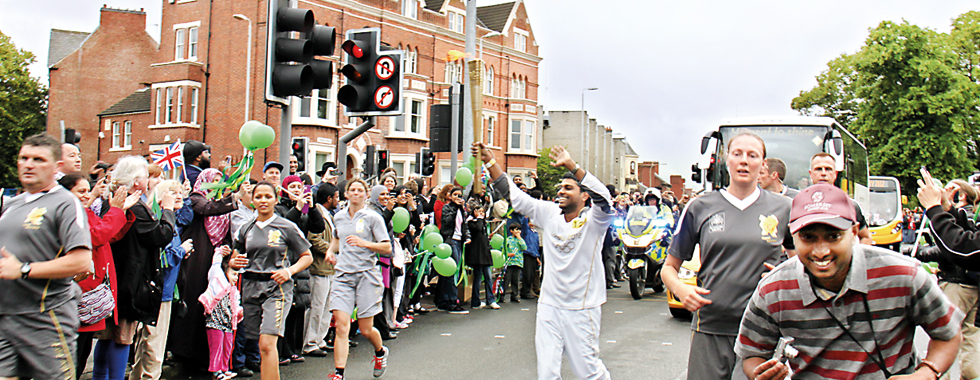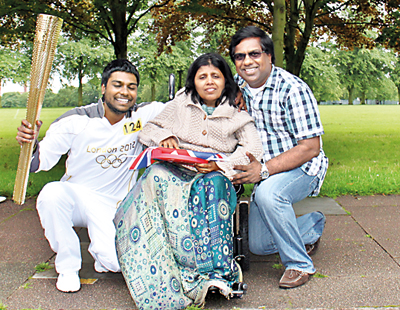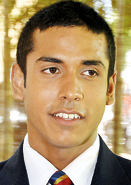Up went the torch, so did the cheers
For Haresh Selvaskandan, the best thing about carrying the Olympic Torch was having his parents and friends there to support him. Perhaps this is a reflection of the life and attitudes of a young man who went into medicine with the aim of helping others and was chosen to be part of the select group carrying the Olympic Torch thanks to his humanitarian work in the field of medicine.

Exhilarating experience: Haresh carrying the Olympic Torch cheered by the crowd
The Olympic Torch is perhaps the most famous herald of the Olympic Games. It is ignited at the site of the Ancient Olympics in Olympia, Greece several months before the opening ceremony of the Olympic Games. This year the Olympic Flame arrived in Britain on May 18, and 8000 inspirational individuals were selected to carry it through over 1000 cities, towns and villages in the lead-up to the London Olympics beginning on July 27. To be asked to be a torchbearer of the Olympic Flame is considered to be one of the greatest honours within and outside the sporting world.
Haresh describes his stint with the Olympic torch as ‘exhilarating.’ He and a handful of other selected torchbearers who were running on July 2 set off on the ‘Torch Bus’ from Abbey Park in Leicester. “This was easily the most inspiring environment I’d been in. There were journalists who had risked their lives to save the injured in earthquakes, philanthropists that had given up their careers to focus on educating those in need and even people barely into their teens who had already overcome the most challenging of circumstances to become incredible people,” he recalls.
“One by one we dropped off the men and women who would be carrying the flame before me, until finally it was my turn to step on to the streets with my torch. This moment was absolutely exciting.
I stepped out of the bus with my torch and was greeted by cheers from crowds of people gathered at my hand over point. I genuinely felt like a celebrity for those 10 minutes. Everyone was rushing to get pictures of me. Well, it was the torch they were after, but I’d like to think it was for me and I had to fight through the crowd to get to my mom, who sat completely bundled up in sweaters on her wheelchair looking so happy I thought she was going to explode.
“Then came the Coca-Cola, Lloyds TSB and Samsung convoys shouting out my name as they drove past, followed closely by an official on a bicycle. He stopped by me and instructed me on what was going to happen during the transfer of the flame. Just a few minutes later, my torch was being ignited by the Olympic Flame. It was such a surreal, but incredible feeling.
“When my torch was lit, I held it up high to the cheers of the crowd, and started my run. I was able to see so many of my friends lining the streets. I tried to give them all high fives as I ran past, and while I thought it was cool at the time, in retrospect, I was just zig zagging the streets with the torch, which brought a lot of laughs to friends and family watching,” Haresh writes in an email to the Sunday Times.
“Then I reached my hand over point and transferred the flame to the next bearer, at which point I had to board the Torch Bus again to be taken back to Abbey Park. It was easily one of the most exhilarating experiences of my life.”
Born in Hong Kong and moving back to Sri Lanka at the age of four, Haresh schooled at British School Colombo and the Colombo International School. It’s at CIS that he says he became the person he is today, thanks to a combination of a “great group of friends and an amazing set of inspiring teachers”.
His decision to go into medicine was spurred on by personal and conscience reasons. His mother is an unfortunate sufferer of Multiple Sclerosis who couldn’t find the care she needed through the country’s healthcare system. This coupled with what he calls “inequalities in health”, whereby healthcare is distributed unjustly and unevenly among countries across the world helped him decide his calling in life. A genuine passion for the sciences certainly helped in embarking on this mission, he adds.

A moment to share: Haresh with his parents
Joining Leicester Medical School in 2007, he discovered Medsin; a national organization of students affiliated to the UN dedicated to tackling inequalities in global health distribution. For three years of medical school, he worked with Medsin, setting up projects that aimed to help asylum seekers, the homeless, the financially less privileged and even the orphans in Kenya.
He established the Kenyan Orphan Project in Leicester, which fundraised in UK and took medical students over to Kenya during the summer for grassroots level involvement, with work in local hospitals and community health centres. In 2010 he was voted in as Vice-Chancellor of Medsin-UK. In the same year, he graduated with a First Class degree from a Bachelor of Sciences in Neurosciences which he took a year out from medical school to complete.
It was his friend Lahiru Sathirisinghe who nominated him in late 2011 for his work with Medsin and the Kenyan Orphan Project. “I was incredibly touched by the nomination and it pushed me to want to do more, but I really was not expecting anything to come out of it,” says Haresh. It was in early December 2011, when he was outside Leicester on a Surgical Placement and bumped into an ecstatic Lahiru in the corridors, that he found out that his nomination had become a conditional selection. In March 2012 this selection was confirmed.
At present, he works as a regional coordinator for Medsin and keeps his scientific interests alive through work on various projects with clinicians. For now his aim is to be a good student and focus on his finals-he needs to get through if he wants his shot at making the world that proverbial better place. One day he’ll be back where he started off though. “My ultimate goal is to go into academic nephrology and play a key role in International Development, starting in Sri Lanka,” Haresh says.
comments powered by Disqus
























